Operating a Food Business
It is a requirement that all food businesses in Queensland comply with the requirements of the Food Act 2006, including the Food Safety Standards, as well as other applicable Council Local Laws such as footpath dining.
The purpose of the Food Act 2006 is to ensure food for sale is safe and suitable for human consumption. Council is responsible for monitoring the standard of operations in food premises and Environmental Health Officers conduct routine inspections and respond to reports of poor food handling, to monitor compliance with the Food Act 2006 and Food Safety Standards.
Council Environmental Health Officers can be contacted for advice and assistance related to food safety matters and when a food licence may be required to operate.
Further information about when you need a food business licence, the types of food businesses Council licences, training requirements and other information is detailed below in the FAQs.
Applying for a Food Business Licence
Complete the applicable application form for the type of food business you are proposing to operate and submit it to Council at least 30 days prior to your intended start date to allow Council officers adequate time to make an assessment.
- Fixed premises, mobile premises (including water carriers) and domestic/home kitchens:
Application for Food Business Licence - Fixed and Mobile Premises (including checklist) (PDF 710.5KB)
Food Application Guide (PDF 756.5KB)
Design approval - For new or existing premises where an alteration of the layout and/or relocation or addition of new equipment, fixtures and fittings is proposed a design approval (plan assessment and approval) will be required PRIOR to the food business licence being issued.
These applications must be submitted at least 30 days prior to the intended start date and must be accompanied by a floor plan and elevations drawn to a scale and quality that enables a review and assessment against the relevant Food Safety Standards.
Failure to submit all relevant drawings and related information of sufficient standard and quality will require a further information request and may delay the intended start date for your food business.
Further information is provided in the Frequently Asked Questions (FAQ) section below
Guidelines for the Use of Domestic Kitchens for Commercial Food Preparation (PDF 277.1KB)
Application for Food Business Licence - Temporary Premises (including checklist) (PDF 1MB)
Guideline for the Establishment of a Temporary Food Premises (PDF 433.5KB)
Provide additional supporting information where required. Details about what information should be submitted with your application can be found in the FAQs below.
Some food businesses may require a food safety program to reduce food safety risks. For example, in catering businesses and when serving food to vulnerable persons.
Food businesses that rely on non-reticulated water supply (e.g. tank water; bores etc) will need to take measures to ensure that their water supply meets potable water standards as required by the Australian Drinking Water Guidelines.
Payment of the applicable fee is required before an assessing officer can be assigned to your application:
- Council's current fees & charges
- Council’s food business licence fees are a tiered system, depending on the risk level of the activity undertaken.
- Ensure you complete the 'Payment' section of the application and indicate how you will be making payment - options include over the phone, cheque or in person at one of Council's administration buildings.
Please note: If your application has not been completed in full, is missing required supporting information or is not paid for, assessment of your application may be delayed until the information is provided, or your application could be refused.
The Food Safety Standards stipulates that all food businesses must provide the following information to the relevant local government before the business commences any food handling activities.
- contact details for the food business including the name of the food business and the name and business address of the proprietor of the food business;
- the nature of the food business; and
- the location of all food premises of the food business that are within the jurisdiction of the enforcement agency.
What happens next?
If you are starting a new food business, taking over an existing food business or making alterations to your current food business, the following fact sheets provide a general overview of the application and assessment process:
Frequently Asked Questions
Food Safety Programs
A Food Safety Program is a 'live document' that outlines how a business will identify and control food safety hazards when producing, manufacturing or handling food. It is not mandatory for all types of food businesses, but it is a good idea to have one so that you have a plan for managing food safety.
Licensable food businesses must have an accredited food safety program if:
- the food business involves off-site catering, e.g. provides catering at events
- the primary activity of the food business is on-site catering
- the primary activity of the food business is on-site catering at part of the premises where they are catering to 200 or more people on 12 or more occasions in any 12-month period, e.g. convention centre
- the food business is carried on as part of the operations of a private hospital or otherwise processes or serves potentially hazardous food to six or more vulnerable people. For example: nursing home, childcare facility.
Read more about food safety programs for:
Other food businesses that are not required to have a food safety program may choose to apply for accreditation of a food safety program.
A Food Safety Program should:
- Identify all potential food safety hazards that may be reasonably expected to occur in the food business' operations
- Identify solutions for controlling these hazards
- Include daily records that demonstrate regular measurement and observation for each of the controls
- Provide procedures for corrective action when a hazard is found to not be under control
- Provide for the regular review of the program by the food business to ensure its adequacy
- Include a documented mechanism that outlines basic food safety procedures should the Food Safety Supervisor become absent
You can use a Queensland Health template or create your own that addresses the above. Templates are available online from the Develop a Food Safety Program page of the Queensland Health website.
What does accreditation involve?
The local council where your business is located is responsible for accrediting your food safety program. Accreditation of a food safety program is a one-off process. Re-accreditation will only be required if the food safety program is amended to include a major process change.
Your application for accreditation of a food safety program must be accompanied by the written advice of an approved food safety auditor. The register of approved food safety auditors can be accessed through the Food Safety Program Compliance page of the Queensland Health website.
Within six months of accreditation, you will need to organise the first compliance audit and engage your selected food safety auditor to confirm you are adhering to your plan. Audits from a food safety auditor will be required at regular intervals to ensure you are adhering to your food safety program.
Council will determine how often you will need to be audited by a food safety auditor.
What are the benefits of a food safety program?
Even if you don't need to have an accredited food safety program, you can still create one for your food business. A food safety program will give you the tools and techniques to adopt best practices in food safety.
An appropriate and well implemented food safety program can help a food business:
- ensure food for sale is safe
- manage their operations better through improved record keeping and cost control
- demonstrate that all due diligence was exercised in the preparation and sale of food.
It is a requirement that all food businesses in Queensland comply with all requirements of the Food Act 2006, including the Food Safety Standards.
As a general guide, a cafe, restaurant, takeaway or similar food business that prepares or handles unpackaged food for retail sale needs a licence. Examples of unpackaged foods that require a licence include:
- processing fruit or vegetable juice
- cutting fruit or vegetables
- making and/or handling cakes, muffins or biscuits
- unpackaged takeaway food such as hot chips, hamburgers, pizzas or salads
- making food by combining ingredients such as jams, sauces, curries or soup
- bread and bread rolls
- sandwiches, including toasting sandwiches
- repackaging some types of bulk food into smaller containers such as coffee or spices
Please note, this is not an exhaustive list and if you still have queries about the type of product you are going to prepare and sell, contact Council to speak with an Environmental Health Officer.
If you are a non-profit organisation, different rules may apply - please refer to 'Licensing for Non-profit Organisations' section.
Read more about when a food licence is required.
It is important to note that while some types of food handling do not require a food business licence to operate, you must still comply with the Food Act 2006 and Food Safety Standards.
As a general guide, you may not require a licence for a food business if you only handle or sell:
- packaged food
- unpackaged snack food, including:
- croissants, friands, doughnuts, muffins, churros, biscuits or cakes without dairy fillings or dairy icings
- carob, chocolates, chocolate bars, confectionery or muesli bars
- dried vegetable chips, corn chips, potato chips or nuts
- pretzels, puffed rice, soy chips or toasted corn
- meat jerky, dried or glazed fruit
- whole fruit or vegetables
- the following, unless it forms a potentially hazardous food:
- whole, crushed, puffed or toasted nuts, grains and seeds
- quinoa, spices, dried herbs, tea leaves, coffee beans, cereals or cocoa
- coconut, couscous, edible oil, flour, legumes, lentils, noodles, oats or pasta
- preparations for spreading on bread such as honey, peanut butter, hazelnut spread, vegemite, marmalade and jam
- sugar and syrups such as golden syrup, maple syrup, rice syrup, malt syrup, glucose syrup and coconut syrup
- drinks only (other than fruit or vegetable juice processed at the place of sale), including:
- tea or coffee
- soft drinks
- alcoholic drinks (you may still require a liquor licence from the Office of Liquor and Gaming Regulation)
- you only sell ice or flavoured ice, for example:
- shaved ice or snow cones
- slurpees.
For example, a cafe selling coffee and tea does not need a food business licence if it only serves pre-packaged cookies.
Please note, if you are unsure whether your business fits into one of these categories, contact Council to speak with an Environmental Health Officer.
Read more about when a food licence may not be required.
In compliance with the Food Standards Code all non-profit or community organisations must complete and submit the Notification of Non-Profit Organisation Food Event.
Under the Food Act 2006, a meal is defined as food that:
- is, or is intended to be, eaten by a person sitting at a table, or a fixed structure used as a table, with cutlery; and
- is of adequate substance as to be ordinarily accepted as a meal.
Examples of when a non-profit organisation may require a licence include:
- a restaurant, open daily to the public, operated by a sporting club to raise revenue for the club
- a non-profit organisation preparing and selling meals to homeless persons at a homeless persons shelter or hostel
- the preparation of meals by Meals on Wheels
- mobile food van (providing meals) at a sporting ground.
Please note, this is not an exhaustive list and if you still have queries about the type of product you are going to prepare and sell, contact Council to speak with an Environmental Health Officer.
Legal Requirements
Non-Profit Organisation Notification obligations:
Section 13 Food Act 2006 defines a food business as:
A business, enterprise or activity that involves—
(a) the handling of food intended for sale; or
(b) the sale of food;
regardless of whether the business, enterprise or activity concerned is of a commercial, charitable or community nature and whether it involves the handling or sale of food on 1 occasion only.
Section 8 Food Act 2006 states that the main purposes of the Act are:
- to ensure food for sale is safe and suitable for human consumption;
- to prevent misleading conduct relating to the sale of food;
- to apply the food standards code.
Regardless of whether your non-profit organisation is exempt from licensing requirements, non-profit organisations still have an obligation to comply with all other provisions of the Food Act 2006 and the Food Safety Standards to ensure that all food is safe and suitable for human consumption.
The following links will take you to information designed to assist non-profit groups meet their obligations under the legislation:
Training Requirements
Non-profit organisations also have an obligation under the Act to ensure that all persons undertaking food handling operations have appropriate skills and knowledge required to produce safe and suitable food. Refer to the Queensland Government 'Food Safety in Non-profit Organisations' guide for further information
There are a variety of options that a non-profit organisation may take to ensure that the food handlers have adequate skills and knowledge which may include:
- in-house and external training organisations offering food safety training
- online food safety training e.g. DoFoodSafely
- developing operating procedures that clearly outline the responsibilities of food handlers
- distribution of relevant documentation to food handlers, such as fact sheets.
Fee exemptions
Where a non-profit organisation is required to hold a licence with Council, a 50% discount of the Food Licence Fee may be granted upon receipt of a written application to the Director Planning & Environmental Services verifying their non-profit status.
Please refer to Council's Fees & Charges for further information.
Southern Downs Regional Council may permit the use of domestic kitchens for the commercial preparation and sale of food for the following purposes:
- Bed & Breakfast or similar rental accommodation providers (meals for guests only)
- Motel (meals for guests only)
- Manufacturing of low-risk foods / snack food (but not ready to eat meals), for sale at:
- markets or fetes; or
- directly from the premises; and
- minor sales only through wholesale (for example, to other commercial food premises)
- The types of low-risk foods permitted include non-potentially hazardous foods, such as:
- Jams, pickles and chutneys
- Cakes and other baked goods; and
- Snack foods (confectionary, biscuits, nuts, dried fruits)
Refer to Council's Use of Domestic Kitchens for Commercial Food Preparation (PDF 277.1KB) guideline document to help determine whether you are eligible to operate a food business from your home kitchen.
If you are unsure whether you may meet the criteria or have questions about how to meet the minimum requirements, please contact Council to speak with an Environmental Health Officer.
Please note, there are requirements under Council's town planning scheme to operate a home-based business prior to operating - refer to the Home-based business factsheet (PDF 292.3KB).
Below is a list of types of food premises and information about the fit-out and design standards they are required to meet when applying for a food business licence with Council:
Fixed Food Premises
- Floor plans are to be submitted with a food licence application. Consider this example of a floor plan for a fixed premises.
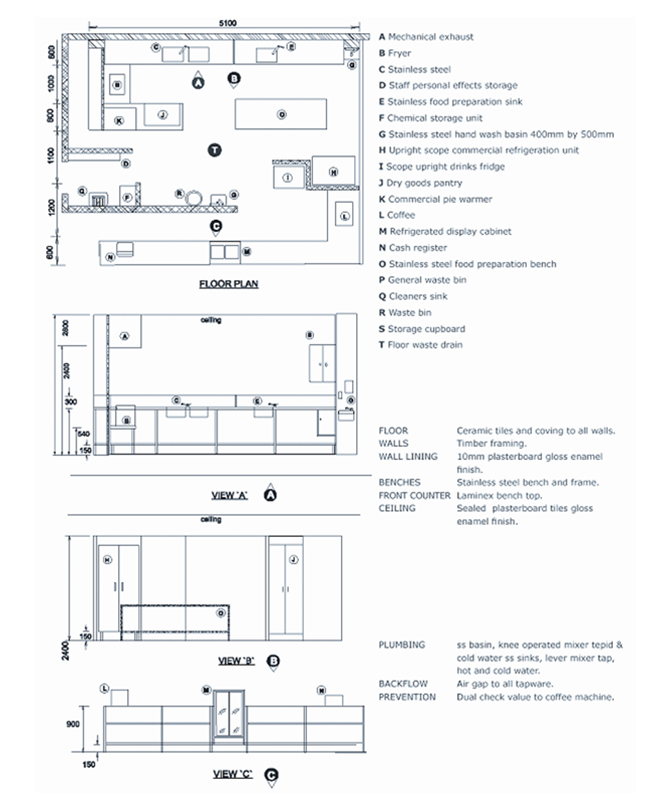
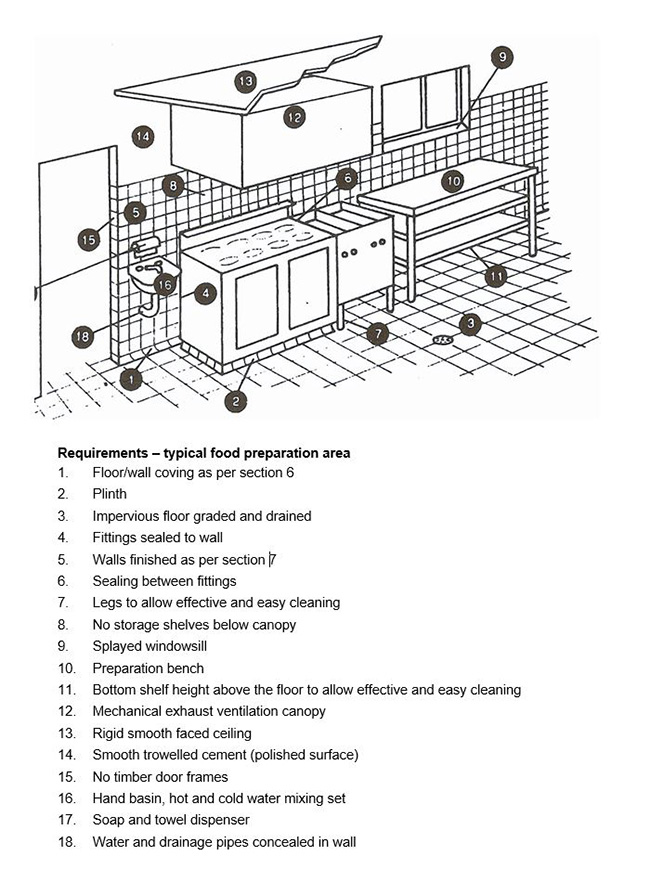
Mobile Food Premises or Food Vehicle
- A mobile food premises is one that includes:
- a vehicle from which a person sells unpackaged food by retail
- a food vending machine
- Floor plans are to be submitted with a food licence application. Consider this example of a floor plan for a mobile premises.

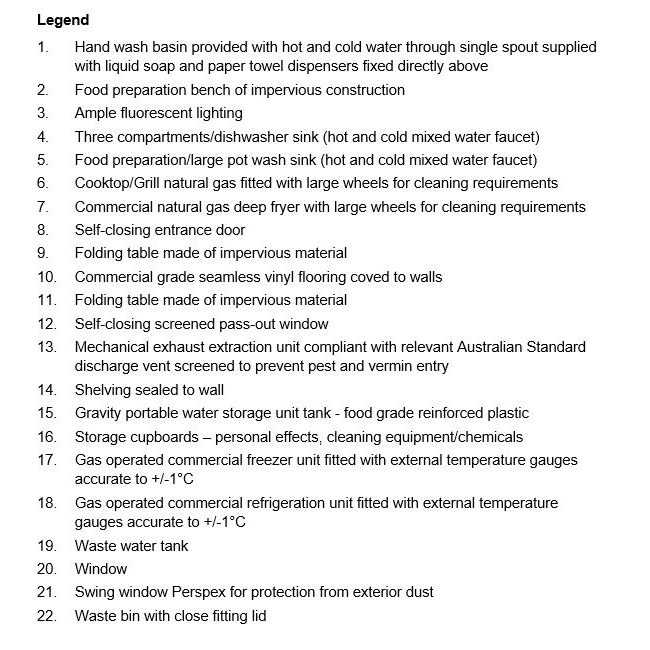
- A mobile food business only requires licensing from one local council in Queensland to operate across the state.
Temporary or Market Food Stall Premises
- Market stalls and stalls at fetes are examples of a temporary food business.
- Refer to the artist impression of the minimum standards for the operation of temporary food stall for more specific information on the requirements for this kind of operation.

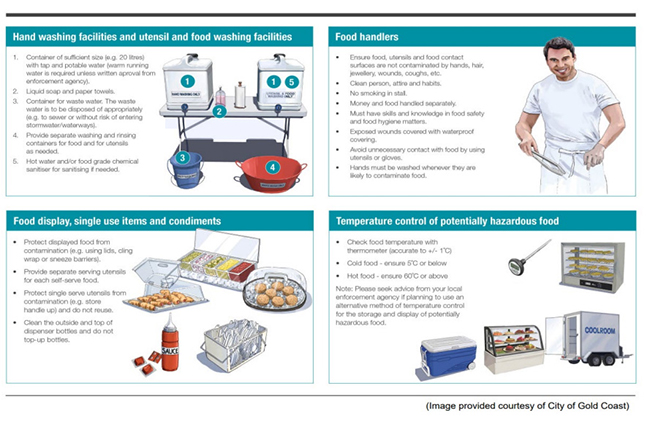
- Floor plans are to be submitted with a food licence application. The floor plan does not have to be drawn to scale but must be of sufficient scale and quality to enable a proper review and assessment for compliance with the Food Safety Standards.
Failure to provide plans drawn to an adequate scale and quality will not be assessed and may impact on your ability to operate in the proposed timeframe. The following information should be included as a minimum:
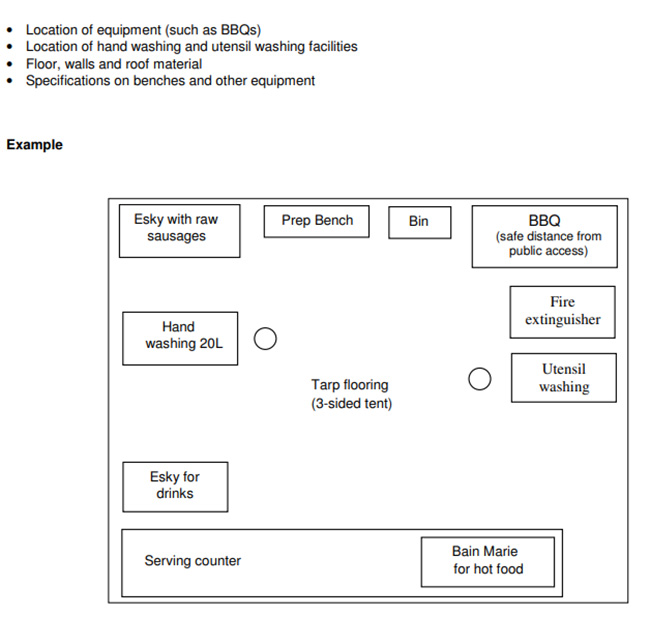
- If you operate your temporary business in more than one local government area, you are required to hold a food business licence with each of the local councils where you intend to operate
Domestic or Home-based Food Premises
Read more about design and fit-out requirements for food businesses.
All licensable food businesses must have and nominate a food safety supervisor. The food safety supervisor must be someone who:
- knows how to recognise, prevent and alleviate food safety hazards of the business;
- has skills and knowledge in food safety matter relevant to the business
- has the authority to supervise and give directions about food safety matters to food handlers; and
- be reasonably available to be contacted while the food business is being carried on by both employees and the local government.
Read more about:
Training requirements
A food safety supervisor should have training based on the food sector that they are working in. Competency codes and titles are set by the National Quality Council and may change. If your food safety supervisor has a different competency code or title, contact Council for advice.
It is recommended that the food safety supervisor completes training and obtains a statement of attainment issued by a registered training organisation (RTO). Please ensure you confirm that your chosen training provider is a current RTO and will provide a statement of attainment upon successful completion of the recommended competencies.
The Queensland Government 'Food Safety Supervisor' webpage outlines the training course codes recommended for different types of food handling. Search for these course codes on the Training.gov website for an RTO nearby that provides it.
How to notify Council
> For new food businesses, this person can be nominated either with your food licence application or within 30 days of a licence being approved.
> For existing food businesses, if you have a new food safety supervisor or have had a change in food safety supervisors, please notify Council using the Food Safety Supervisor Notification Form. (PDF 890.4KB)
The Food Act 2006 requires all food handlers to have skills and knowledge in food safety and food hygiene matters related to the job they do.
A food handler is anyone who works in a food business that:
- handles food, or
- works with surfaces that are likely to be in contact with food such as cutlery, plates and bowls.
Please note that food handler requirements are different to food safety supervisor training requirements.
For help with understanding the obligations of food businesses under the Act, please follow the attached links to The Food Pantry training program and resources for food businesses on the Queensland Health website.
Queensland Health | The Food Pantry
Queensland Health | Resources for food businesses
On the Queensland Health | Resources for food businesses page, you will find a free online training course called Do Food Safely. The certificate provided upon successful completion of this course can be kept as part of your staff training records.
Read more about food handler responsibilities including health and hygiene.
Training for Food Safety Supervisors
Refer to 'Who Needs a Food Safety Supervisor' section for information about specific training requirements.
Council does not regulate food businesses operated by state or government-owned corporations and state school tuckshops operated by a Parents and Citizens Association (this does not include private schools).
The Food Act 2006 (the Act) does not bind these types of businesses and therefore do not require a food licence from Council. Queensland Government facilities operating as a food business are required to comply with administrative arrangements equivalent to the provisions of the Act, and are monitored by Queensland Health Public Health Units.
Please note: If a food business is operated by a private commercial entity within a Queensland Government facility (e.g. sub-leased) then this exemption does not apply and a food business licence with Council is required.
For example, a state school tuckshop is being operated by a private individual to make a profit, then the individual is required to hold a ood business licence with Council.
If you are purchasing or selling an existing food business, applying for a health search inspection (PDF 352.4KB) (a pre-sale inspection) is recommended to check the current level of compliance. It is not a mandatory requirement, but it is helpful when considering purchasing a business.
An Environmental Health Officer will inspect the premises before issuing a report. The report will provide written information on the current condition of the premises and will outline areas of non-compliance in relation to the design, maintenance and cleanliness.
Please note:
- If you are requesting this kind of search and are not the current food licence holder, you will need to obtain a letter of consent from the current permit holder/operator.
- Even if the business has a current licence, if you are the new owner you will need to apply for a food business licence in your own name before you can start operating.
Food safety is just one aspect of what you need to know when starting a food business. For general information about starting a business see Business Queensland. This includes topics about registering your business name, legal business structures, getting finance, leasing, taxation, employing staff, other licences and permits and more.